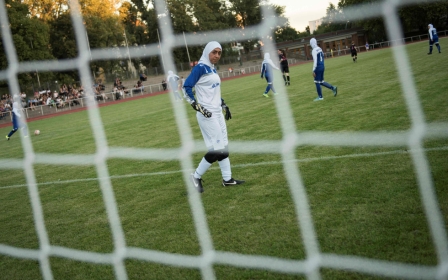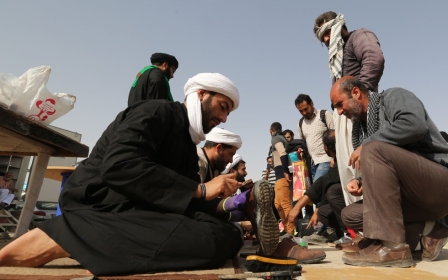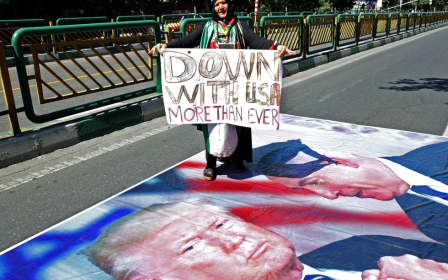Iranian press review: Arrested environmentalists appear in court

Iranian environmentalists go on trial after being jailed for one year
The trial of eight Iranian environmentalists began on 30 January following one year spent by the activists in Tehran’s notorious Evin prison, according to the IRNA news agency. The first session of the trial was held behind closed doors and the court only permitted lawyers vetted by Iran’s judiciary to be present.
Nine ecologists and activists were arrested on 24 and 25 January 2018, and have since been kept in custody with no trial or convictions.
Last February, one of the activists Kavous Seyed-Emami, a dual Canadian national, died in prison.
The Islamic Revolutionary Guard Corps (IRGC) intelligence arm arrested Taher Ghadirian, Niloufar Bayani, Amirhossein Khaleghi, Houman Jokar, Sam Rajabi, Sepideh Kashani, Morad Tahbaz and Abdolreza Kouhpayeh on charges related to espionage. So far only one of the detainees have access to a lawyer of his own choosing.
Iran’s official minister of intelligence, and the Iranian Department of Environment have emphasised on various occasions that the charges against the conservationists are baseless. Iranians also took to Twitter urging their release using the hashtag #FreeEnvironmentalists.
The activists are members of Persian Wildlife Heritage Foundation, which focuses on preserving rare wildlife in Iran. The arrested members of the foundation are accused of using wildlife cameras to take photos of Iran’s missile sites.
Iran to be 'self-sufficient' on gasoline
“Iran is on the verge of producing all [the] gasoline it needs,” reported the Aftab-e Yazd daily on 27 January. In previous months, Iran has reduced daily gasoline imports from 20 million litres to less than five million litres to this oil-rich country.
Iran, 111 years after the discovery of oil reserves in its territory, is still an importer of petrol. However, in 2018 - after the reimposition of unilateral American sanctions against the country - the authorities began attempts to become self-sufficient in gasoline production.
High fuel consumption in Iran and a daily trafficking of over five million litres of gasoline to its neighboring countries are the main obstacles that the Iranian government is facing to become fuel self-sufficient.
According to the latest report by the government, Iranians consume 91 million litres of petrol every day, which is six times more than the world’s average consumption. The report shows that the 21 million cars in Turkey consume eight million litres of petrol every day, while Iran’s 19 million cars consume over 11 times more petrol compared with Turkey.
More poor Iranians survive on trash
The number of poor Iranians living on informal waste-picking in big cities has been mounting in recent months, according to the Arman daily. On 26 January, the paper reported that this rise in numbers has occurred due to recent economic hardships and a sharp increase in Iran’s inflation rate from 9.6 percent in 2017-18, to 23.8 percent in 2018-19.
Amanollah Gharaei Moghadam, an Iranian sociologist, told the paper that addicts and working children had been the only informal garbage collectors in Tehran in previous years. He explained that now the poor and economically marginalised Iranians and Afghan refugees are collecting waste from the streets, regardless of their age or gender.
“Over 12 million [Iranians and immigrants] live in ghettos across the country,” Moghadam said.
“Poverty in ghettos is an important factor influencing informal waste-collecting. This social issue will cause indignation among the poor, which will eventually transfer the anger to the entire society.”
New studies on waste management in Tehran show that the majority of informal waste-pickers in the Iranian capital are Afghan refugees under 18 years old and the residents of poor ghettos surrounding the city. Tehran’s waste-pickers, working 12 hours daily, can make approximately 4,000,000 rial ($120) in a month.
New political parties ‘mushrooming’ in Iran
On 28 January, the Ebtekra daily - in an analytical piece about the activities of political parties in Iran - said the number of parties in the Islamic Republic was "mushrooming." The article was published a day after Iran’s government spokesman announced that President Hassan Rouhani’s administration had granted permission to 40 political groups to form new parties.
"The existence of political parties results in dynamics of political systems,” the paper wrote.
“However, in Iran, the question is why political parties have little influence despite the large number of the registered parties.”
According to the House of Parties of Iran NGO, 251 political parties are legally registered in the country, although only 50 of those are active.
The article argued that political groups were applying to form new parties in order to have a share in power in the country’s upcoming elections.
“We always witness the mushrooming of political parties, when elections come close in the country,” the article continued. “After the elections, though, these seasonal parties hide in their shells.”
Iran’s next parliamentary elections will be held in February 2020, and Iranians will go to the polls to choose their next president in May 2021.
* The Iranian press review is a digest of reports in Farsi-language publications that are not independently verified as accurate by Middle East Eye.
New MEE newsletter: Jerusalem Dispatch
Sign up to get the latest insights and analysis on Israel-Palestine, alongside Turkey Unpacked and other MEE newsletters
Middle East Eye delivers independent and unrivalled coverage and analysis of the Middle East, North Africa and beyond. To learn more about republishing this content and the associated fees, please fill out this form. More about MEE can be found here.




